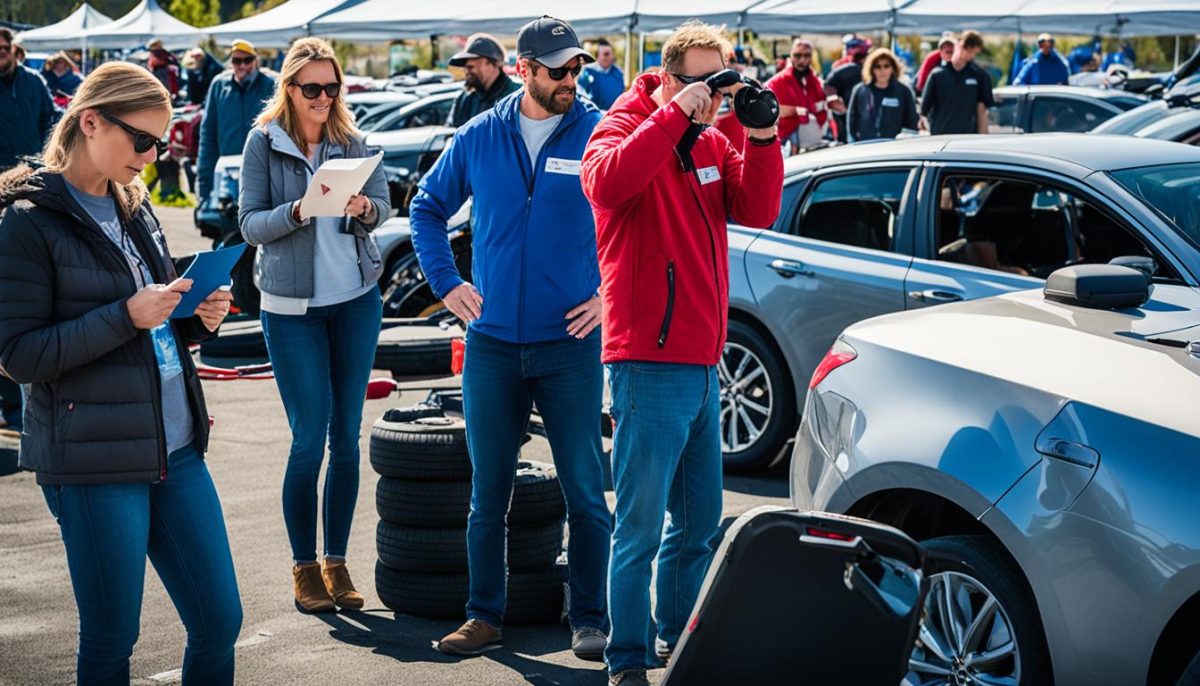How to Bid at a Car Auction
In this section, we will provide you with a step-by-step guide on how to successfully bid at a car auction. From understanding the auction process to preparing yourself before the auction begins, we’ve got you covered.
Understanding the Car Auction Process
When participating in a car auction, it’s crucial to have a thorough understanding of the car auction process and familiarize yourself with common auction terminology. This knowledge will empower you to make informed decisions and navigate the auction with confidence.
To give you a clear picture of what to expect, let’s break down the car auction process into its key stages:
1. Registration
The first step in the car auction process is registration. This involves providing your information, such as your name, contact details, and in some cases, a deposit. Registration allows you to participate in bidding and receive the necessary bidder identification.
2. Vehicle Inspection
Before the auction begins, take the opportunity to inspect the vehicles you’re interested in. Carefully examine their condition, noting any visible defects, cosmetic issues, or mechanical problems. As a buyer, it’s essential to assess the value and condition of the vehicles before placing your bids.
3. Auction Terminology
Now, let’s familiarize ourselves with some common auction terminology. Understanding these terms will help you communicate effectively and decipher the information provided during the auction:
| Term | Definition |
|---|---|
| Reserve Price | The minimum price set by the seller for a vehicle to be sold. If the bidding does not reach this price, the vehicle may be withdrawn from the auction. |
| Hammer Price | The final price at which the auctioneer’s hammer falls, indicating the winning bid. |
| Buyer’s Premium | An additional fee or percentage charged to the buyer on top of the hammer price. |
| As-Is | The vehicle is sold without any warranties or guarantees. The buyer is responsible for any repairs or issues that may arise after the purchase. |
| Lot Number | A unique number assigned to each vehicle or item being auctioned. |
These are just a few examples of commonly used auction terms, but there are many others you may come across. Take the time to familiarize yourself with these terms to avoid any confusion during the auction.
Now that we have a solid understanding of the car auction process and common auction terminology, we can confidently move forward. In the next section, we will delve into the necessary preparations you should make before attending a car auction.
Preparing for the Car Auction
Before heading to the car auction, it’s crucial to be well-prepared to ensure a successful bidding experience. In this section, we will discuss the key steps you should take to prepare for the auction.
Thorough Inspection of Vehicles
One of the most important aspects of preparing for a car auction is conducting a thorough inspection of the vehicles you are interested in. Prior to the auction, make sure to research the vehicles on your wishlist and note down any potential issues or damages they may have. Arrive early to the auction venue to have sufficient time for a comprehensive inspection.
Inspect the exterior of the vehicle for any signs of damage, such as dents, scratches, or rust. Look for any indications of previous accidents or repairs. Additionally, check the condition of the tires, lights, and windows.
When inspecting the interior, pay attention to the overall cleanliness and condition of the seats, dashboard, and controls. Test all the features and functionalities, including the air conditioning, radio, and power windows.
Don’t forget to check the engine compartment and examine the engine for any signs of leaks, unusual noises, or excessive wear. It’s crucial to ensure that the vehicle’s engine is in good working condition.
Budgeting and Research
Establishing a budget is essential before attending a car auction. Set a realistic budget that aligns with your financial capabilities and stick to it. Remember to consider additional costs such as registration fees and any potential repairs that may be required.
Research the market value of the vehicles you are interested in, taking into account factors such as the vehicle’s year, make, model, mileage, and condition. This research will help you determine a reasonable bidding range and avoid overpaying for a vehicle.
Be aware of any additional fees or commissions that may be charged by the auction house. Understanding the fees involved will help you avoid any surprises and factor them into your budget.
Researching the Auction Process
Take the time to familiarize yourself with the car auction process. Each auction may have its own rules, bidding procedures, and protocols. Knowing the auction process in advance will give you an advantage and help you navigate confidently.
Research the auction house’s reputation and history. Look for customer reviews and testimonials to gauge the overall satisfaction of past participants. This information will give you insight into the legitimacy and credibility of the auction house.
Finally, it’s essential to understand the auction terms and conditions. Familiarize yourself with the registration requirements, payment methods, and any specific guidelines for bidding. Being well-informed will ensure a smooth and stress-free auction experience.
By thoroughly inspecting the vehicles, budgeting wisely, and researching the auction process, you will be well-prepared for the car auction ahead. Armed with knowledge and confidence, you’ll be ready to make informed decisions and secure the best deal possible for the vehicle you desire.
| Key Steps for Preparing for the Car Auction |
|---|
| 1. Conduct a thorough inspection of the vehicles |
| 2. Research the market value and set a budget |
| 3. Be familiar with the auction process and rules |
| 4. Understand the auction house’s reputation and terms |

Strategies for Bidding at a Car Auction
When it comes to bidding at a car auction, having the right strategies can make all the difference in securing your dream vehicle. From setting a maximum bid limit to understanding bidding increments, here are some effective tactics to help you increase your chances of winning the auction.
1. Research the Market Value
Prior to the auction, research the market value of the car you are interested in. This will give you an idea of its worth and help you determine the maximum amount you are willing to bid. Take note of any additional costs such as buyer’s fees, transportation, and repairs, so you can factor them into your bidding strategy.
2. Set a Maximum Bid Limit
It’s important to set a maximum bid limit before entering the auction. This will prevent you from getting caught up in the excitement and bidding beyond your budget. Determine the highest amount you are willing to pay for the car and stick to it.
3. Start with a Low Bid
When the bidding starts, consider placing an initial low bid to gauge the competition. This tactic can help you identify serious bidders and give you an advantage later on in the auction. Remember, patience is key in securing a winning bid.
4. Understand Bidding Increments
Each auction may have different bidding increments, so it’s crucial to understand how they work. Bidding increments are predetermined amounts that increase with each bid. Familiarize yourself with the increments to ensure your bids are competitive and strategic.
5. Stay Disciplined and Be Prepared to Walk Away
It’s easy to get caught up in the heat of the moment during a bidding war. However, it’s important to stay disciplined and know when to walk away. If the bidding exceeds your maximum bid limit or goes beyond the car’s market value, it’s better to let it go and wait for another opportunity.
6. Consider Proxy Bidding
Some car auctions offer proxy bidding services, where you can set your maximum bid in advance and let the auction house handle the bidding on your behalf. Proxy bidding can be a convenient option if you are unable to attend the auction in person but still want to participate.
By implementing these bidding strategies, you’ll have a better chance of winning bids at car auctions. Remember to do your research, set a budget, stay disciplined, and be patient. With the right approach and strategy, you could drive away with the car of your dreams at a price you’re comfortable with.
Post Auction Procedures
After the excitement of winning a bid at a car auction, it’s time to focus on the post auction procedures. Properly completing the necessary steps is crucial to ensure a smooth and successful transaction. In this section, we will guide you through the essential post auction tasks, including payment, documentation, and vehicle pickup or delivery.
Payment
One of the first post auction procedures is to make the payment for your winning bid. Most car auctions require immediate payment, so it’s important to be prepared. The accepted payment methods may vary depending on the auction house, but commonly include cash, certified bank checks, or wire transfers. Take note of the specific payment instructions provided by the auction house and ensure that funds are readily available.
Documentation
After the payment is made, you will need to complete the necessary documentation for the purchased vehicle. This may include signing a Bill of Sale, providing identification, and obtaining a temporary registration or title. It’s essential to carefully review and understand all the paperwork requirements to avoid any delays or complications in the future. If you’re unsure about any document, don’t hesitate to reach out to the auction house for clarification.
Vehicle Pickup or Delivery
Once the payment and documentation are in order, it’s time to arrange for the pickup or delivery of the vehicle. Depending on the auction house’s policies, you may be required to pick up the vehicle directly from their location or arrange for transportation through a third-party service. If you opt for delivery, additional fees may apply. Make sure to coordinate the logistics in advance and plan accordingly to ensure a seamless process.
Completing the post auction procedures efficiently and accurately is crucial to finalize your purchase and take ownership of the vehicle. By promptly completing the payment, carefully handling the necessary documentation, and organizing the vehicle pickup or delivery, you’ll ensure a successful car auction experience.

Stay tuned for the next section where we’ll share valuable tips to make the most out of your car auction experience.
Tips for a Successful Car Auction Experience
Attending a car auction can be an exciting and rewarding experience. To ensure a successful outcome, it is essential to familiarize yourself with proper auction etiquette and implement effective strategies. Here, we provide you with valuable tips to enhance your car auction experience and increase your chances of finding the perfect vehicle.
Auction Etiquette
Auction etiquette plays a crucial role in creating a positive and respectful atmosphere. Here are a few key points to keep in mind:
- Arrive early: Give yourself enough time to register, inspect the vehicles, and understand the auction rules.
- Be respectful: Avoid disruptive behavior and excessive noise. Maintain a professional demeanor throughout the event.
- Listen carefully: Pay attention to the auctioneer’s instructions and announcements to stay informed about important details.
- Avoid impulse bidding: Set a budget and stick to it. Don’t get carried away by the excitement and bid beyond your financial limits.
- Be courteous to other bidders: Avoid aggressive tactics and allow fair opportunities for others to participate.
Networking Opportunities
Car auctions provide excellent opportunities to network with fellow enthusiasts and industry professionals. Consider these tips to make valuable connections:
- Strike up conversations: Engage in friendly discussions with other attendees who share your passion for cars. You never know who you might meet.
- Exchange contact information: If you come across someone knowledgeable or influential, exchanging contact information can lead to future collaborations or valuable advice.
- Join online communities: Participate in online forums and social media groups dedicated to car auctions. Connect with like-minded individuals and stay updated on upcoming events.
Optimizing Your Time at the Auction
To maximize your chances of finding the right vehicle, consider these time-saving strategies:
- Do your research: Prior to the auction, research the available vehicles and their market values. This knowledge will help you make informed decisions and identify potential bargains.
- Inspect the vehicles: Carefully examine the cars before the auction starts. Check for any signs of damage or mechanical issues. If possible, bring along a knowledgeable mechanic to assist you.
- Set priorities: Create a list of the vehicles you are interested in and prioritize them based on your preferences and budget. This will help you stay focused during bidding.
- Stay organized: Take notes, record vehicle information, and jot down the winning bids for future reference. Keep track of the vehicles that pique your interest for further evaluation.
Takeaways and Wrap-up
After exploring the intricacies of the car auction process, it’s time to recap the key takeaways from our guide. By following the strategies and tips outlined, you can approach car auctions with confidence and increase your chances of securing your dream ride.
First and foremost, preparation is crucial. Take the time to research the auction you plan to attend, inspect the vehicles beforehand, and set a budget. Understanding the auction process, including the different bidding formats and auctioneer cues, will give you a competitive edge.
When it comes to bidding strategies, being patient, focused, and confident is key. Set your maximum bid in advance and stick to it, avoiding impulsive decisions. Consider using proxy bids or bidding increments strategically to outmaneuver competitors.
Finally, remember that the post-auction procedures are just as important. Ensure you complete all necessary paperwork and payment promptly, and arrange for transportation of your new vehicle. By taking these steps, you’ll wrap up your car auction experience successfully.



